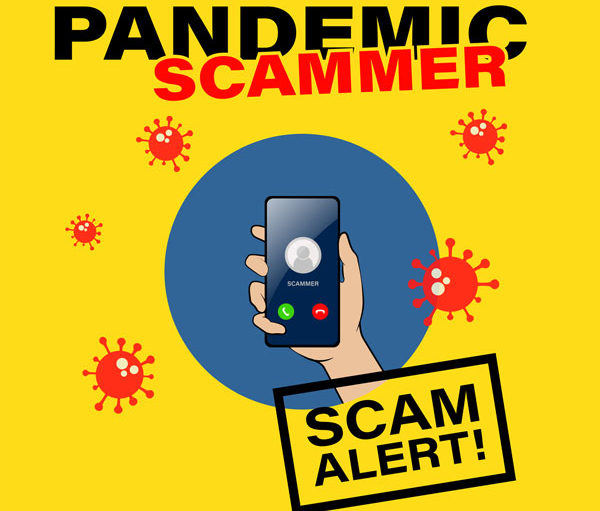Watch Out for an Epidemic of Con Artists

“Get a vaccine for coronavirus!” “Donate to the pandemic relief fund.” “Click here for some important information from the CDC.” Security experts tell us that any time there’s a nationwide emergency, con artists are quick to exploit it. The COVID-19 pandemic is no different.
Older adults may be at higher risk of falling for these scams. These days many are home alone, and con artists are great at luring lonely people into a conversation that ends with money changing hands. Memory loss can make an elder more vulnerable. Recent research even shows that the effects of a hospital stay might cause temporary lapse of judgement. So learn about these scams yourself, and alert senior loved ones. Awareness is the best way to “immunize” ourselves against wasting our money, and even endangering our health.
First, let’s learn what to look out for. Experts from multiple government agencies are raising awareness of several types of pandemic-related scams you might encounter:
- Unscrupulous marketers who sell fake products they claim can treat, diagnose or prevent the virus. Most of these products are absolutely useless—and some may even be dangerous. The most recent reports are of a two-part scam—a fake coronavirus test, and then a fake drug to “cure” the virus (the test is always positive, of course).
- Fake antibody tests, with the assurance that if a person is “positive,” they are not at risk of contracting the virus.
- Callers pretending to be contract tracers from the health department, telling you that you’ve been exposed to the virus—and asking for your health insurance information or bank account number.
- Emails claiming to contain important information from a government agency, with links to malicious websites that can steal your personal data or even hold your computer for ransom.
- Phony charities or crowdfunding appeals, pretending to collect donations to fund research or to help people who are affected by the virus; instead, the money you give supports a crook’s lavish lifestyle.
- Attempts to bill insurance companies and Medicare for nonexistent or useless tests and treatments.
- Shady investment opportunities, exploiting the economic uncertainty of the times. Some claim to be selling stock in a miracle product that will rise hugely in value.
- Phony “work from home opportunities” that take advantage of people whose job security is jeopardized.
- A scam call claiming you received a stimulus money overpayment and demanding you pay it back—with cash, gift cards, or by wiring money. The caller may threaten fines or jail if the victim doesn’t comply.
Educate yourself—knowledge is power.
Being aware of the above examples can help you and senior loved ones hone your skepticism. Here are more valuable tips:
- Don’t click on email links from sources you don’t know, and keep your antivirus software up to date.
- Be very suspicious of product offers that use language like “your doctor doesn’t want you to know about this,” or claims that a particular public figure endorses the product.
- If you receive an unsolicited call or email, never provide your credit card number or Medicare ID number. Hang up the phone, or ignore the email.
- Regularly check your credit card, insurance and Medicare statements and report any suspicious claims and charges.
- If you receive a solicitation from a charity, do your homework. Check to make sure it’s legitimate by doing online research and checking its website.
Don’t miss a legitimate contact
The CDC reminds us that in our caution, we could miss a valid call or email. “You may get legitimate calls from unknown numbers that turn out to be the public health department,” they report. “If you have COVID-19 or have been exposed to COVID-19, your health department may contact you as part of contact tracing activities. Contact tracing is essential to slowing the spread of COVID-19. If your health department leaves a voicemail, return the call, for your own health and the health of others.”
If you think you or a loved one have been victimized
- Contact the National Center for Disaster Fraud Hotline at 866-720-5721 or via email at disaster@leo.gov
- Report it to the FBI at tips.fbi.gov
- Report misleading ads or websites for health products to the Federal Trade Commission by calling 1-877-FTC-HELP (1-877-382-4357).
- If it’s an online scam, submit your complaint through www.ic3.gov/default.aspx
The information in this article is not meant to replace the advice of your healthcare provider.
Source: IlluminAge


